#since like 35% of what inspired the story that turned into MD was me going
Text
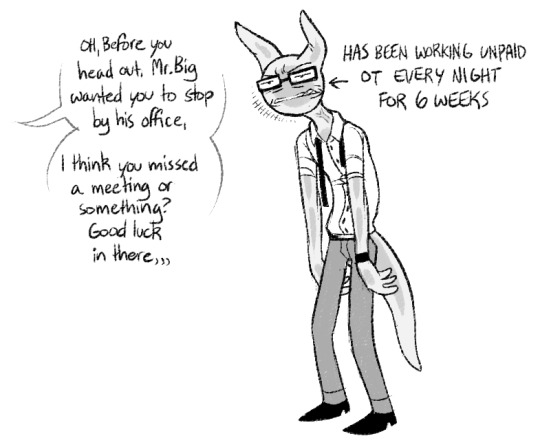

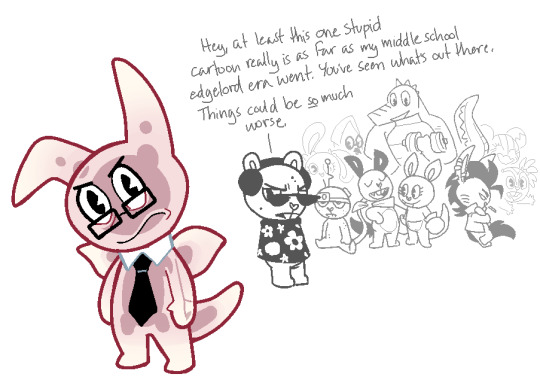
dragging ancient fancharacters out of the grave a decade after the fact. "just how old is this character" Very. artifact of a truly bygone era, he is. his name is kevin.
the reason he's never in a good mood is because he lives in a setting with superheroes and supervillains... and he works for an insurance company. as you can imagine, he this close to becoming a supervillain himself
#mog art#doodles#anthro#furry#sea angel#happy tree friends#HTF#its the only fandom i was ever IN there in there with#and we have to make peace with that bc without it we probably wouldn't have MD#since like 35% of what inspired the story that turned into MD was me going#'what if i made something like this but all the characters were aware of what's going on and are now VERY mentally ill#but this one funky lil guy still wants to inspire everyone to not accept their fate and fight back against whatever is doing this'#'cmon guys lets get our intended genre back'#and that funky lil guy's name? lamarr
86 notes
·
View notes
Text
ESSAY: Berserk's Journey of Acceptance Over 30 Years of Fandom
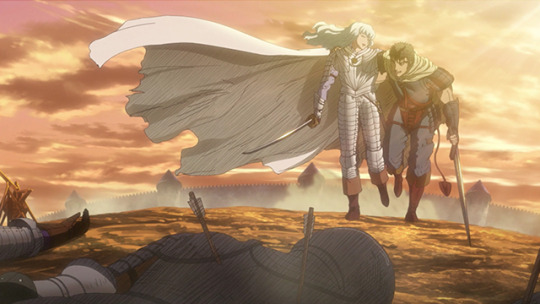
My descent into anime fandom began in the '90s, and just as watching Neon Genesis Evangelion caused my first revelation that cartoons could be art, reading Berserk gave me the same realization about comics. The news of Kentaro Miura’s death, who passed on May 6, has been emotionally complicated for me, as it's the first time a celebrity's death has hit truly close to home. In addition to being the lynchpin for several important personal revelations, Berserk is one of the longest-lasting works I’ve followed and that I must suddenly bid farewell to after existing alongside it for two-thirds of my life.
Berserk is a monolith not only for anime and manga, but also fantasy literature, video games, you name it. It might be one of the single most influential works of the ‘80s — on a level similar to Blade Runner — to a degree where it’s difficult to imagine what the world might look like without it, and the generations of creators the series inspired.
Although not the first, Guts is the prototypical large sword anime boy: Final Fantasy VII's Cloud Strife, Siegfried/Nightmare from Soulcalibur, and Black Clover's Asta are all links in the same chain, with other series like Dark Souls and Claymore taking clear inspiration from Berserk. But even deeper than that, the three-character dynamic between Guts, Griffith, and Casca, the monster designs, the grotesque violence, Miura’s image of hell — all of them can be spotted in countless pieces of media across the globe.
Despite this, it just doesn’t seem like people talk about it very much. For over 20 years, Berserk has stood among the critical pantheon for both anime and manga, but it doesn’t spur conversations in the same way as Neon Genesis Evangelion, Akira, or Dragon Ball Z still do today. Its graphic depictions certainly represent a barrier to entry much higher than even the aforementioned company.
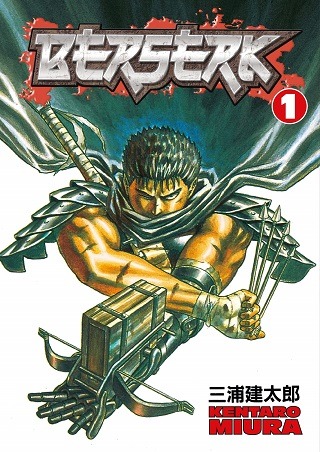
Seeing the internet exude sympathy and fond reminiscing about Berserk was immensely validating and has been my single most therapeutic experience online. Moreso, it reminded me that the fans have always been there. And even looking into it, Berserk is the single best-selling property in the 35-year history of Dark Horse. My feeling is that Berserk just has something about it that reaches deep into you and gets stuck there.
I recall introducing one of my housemates to Berserk a few years ago — a person with all the intelligence and personal drive to both work on cancer research at Stanford while pursuing his own MD and maintaining a level of physical fitness that was frankly unreasonable for the hours that he kept. He was NOT in any way analytical about the media he consumed, but watching him sitting on the floor turning all his considerable willpower and intellect toward delivering an off-the-cuff treatise on how Berserk had so deeply touched him was a sight in itself to behold. His thoughts on the series' portrayal of sex as fundamentally violent leading up to Guts and Casca’s first moment of intimacy in the Golden Age movies was one of the most beautiful sentiments I’d ever heard in reaction to a piece of fiction.
I don’t think I’d ever heard him provide anything but a surface-level take on a piece of media before or since. He was a pretty forthright guy, but the way he just cut into himself and let his feelings pour out onto the floor left me awestruck. The process of reading Berserk can strike emotional chords within you that are tough to untangle. I’ve been writing analysis and experiential pieces related to anime and manga for almost ten years — and interacting with Berserk’s world for almost 30 years — and writing may just be yet another attempt for me to pull my own twisted-up feelings about it apart.
Berserk is one of the most deeply personal works I’ve ever read, both for myself and in my perception of Miura's works. The series' transformation in the past 30 years artistically and thematically is so singular it's difficult to find another work that comes close. The author of Hajime no Ippo, who was among the first to see Berserk as Miura presented him with some early drafts working as his assistant, claimed that the design for Guts and Puck had come from a mess of ideas Miura had been working on since his early school days.
写真は三浦建太郎君が寄稿してくれた鷹村です。
今かなり感傷的になっています。
思い出話をさせて下さい。
僕が初めての週刊連載でスタッフが一人もいなくて困っていたら手伝いにきてくれました。
彼が18で僕が19です。
某大学の芸術学部の学生で講義明けにスケッチブックを片手に来てくれました。 pic.twitter.com/hT1JCWBTKu
— 森川ジョージ (@WANPOWANWAN) May 20, 2021
Miura claimed two of his big influences were Go Nagai’s Violence Jack and Tetsuo Hara and Buronson’s Fist of the North Star. Miura wears these influences on his sleeve, discovering the early concepts that had percolated in his mind just felt right. The beginning of Berserk, despite its amazing visual power, feels like it sprang from a very juvenile concept: Guts is a hypermasculine lone traveler breaking his body against nightmarish creatures in his single-minded pursuit of revenge, rigidly independent and distrustful of others due to his dark past.
Uncompromising, rugged, independent, a really big sword ... Guts is a romantic ideal of masculinity on a quest to personally serve justice against the one who wronged him. Almost nefarious in the manner in which his character checked these boxes, especially when it came to his grim stoicism, unblinkingly facing his struggle against literal cosmic forces. Never doubting himself, never trusting others, never weeping for what he had lost.
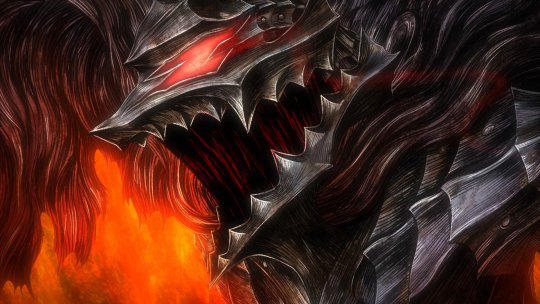
Miura said he sketched out most of the backstory when the manga began publication, so I have to assume the larger strokes of the Golden Arc were pretty well figured out from the outset, but I’m less sure if he had fully realized where he wanted to take the story to where we are now. After the introductory mini-arcs of demon-slaying, Berserk encounters Griffith and the story draws us back to a massive flashback arc. We see the same Guts living as a lone mercenary who Griffith persuades to join the Band of the Hawk to help realize his ambitions of rising above the circumstances of his birth to join the nobility.
We discover the horrific abuses of Guts’ adoptive father and eventually learn that Guts, Griffith, and Casca are all victims of sexual violence. The story develops into a sprawling semi-historical epic featuring politics and war, but the real narrative is in the growing companionship between Guts and the members of the band. Directionless and traumatized by his childhood, Guts slowly finds a purpose helping Griffith realize his dream and the courage to allow others to grow close to him.
Miura mentioned that many Band of the Hawk members were based on his early friend groups. Although he was always sparse with details about his personal life, he has spoken about how many of them referred to themselves as aspiring manga authors and how he felt an intense sense of competition, admitting that among them he may have been the only one seriously working toward that goal, desperately keeping ahead in his perceived race against them. It’s intriguing thinking about how much of this angst may have made it to the pages, as it's almost impossible not to imagine Miura put quite a bit of himself in Guts.
Perhaps this is why it feels so real and makes The Eclipse — the quintessential anime betrayal at the hands of Griffith — all the more heartbreaking. The raw violence and macabre imagery certainly helped. While Miura owed Hellraiser’s Cenobites much in the designs of the God Hand, his macabre portrayal of the Band of the Hawk’s eradication within the literal bowels of hell, the massive hand, the black sun, the Skull Knight, and even Miura’s page compositions have been endlessly referenced, copied, and outright plagiarized since.
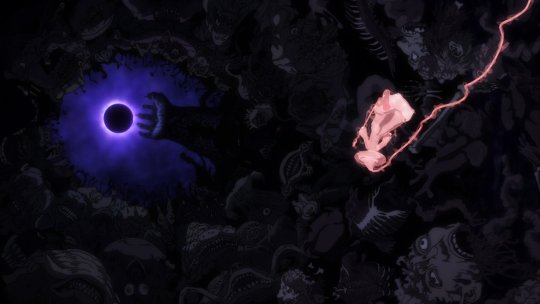
The events were tragic in any context and I have heard many deeply personal experiences others drew from The Eclipse sympathizing with Guts, Casca, or even Griffith’s spiral driven by his perceived rejection by Guts. Mine were most closely aligned with the tragedy of Guts having overcome such painful circumstances to not only reject his own self enforced solitude, but to fearlessly express his affection for his loved ones.
The Golden Age was a methodical destruction of Guts’ self-destructive methods of preservation ruined in a single selfish act by his most trusted friend, leaving him once again alone and afraid of growing close to those around him. It ripped the romance of Guts’ mission and eventually took the story down a course I never expected. Berserk wasn’t a story of revenge but one of recovery.
Guess that’s enough beating around the bush, as I should talk about how this shift affected me personally. When I was young, when I began reading Berserk I found Guts’ unflagging stoicism to be really cool, not just aesthetically but in how I understood guys were supposed to be. I was slow to make friends during school and my rapidly gentrifying neighborhood had my friends' parents moving away faster than I could find new ones. At some point I think I became too afraid of putting myself out there anymore, risking rejection when even acceptance was so fleeting. It began to feel easier just to resign myself to solitude and pretend my circumstances were beyond my own power to correct.
Unfortunately, I became the stereotypical kid who ate alone during lunch break. Under the invisible expectations demanding I not display weakness, my loneliness was compounded by shame for feeling loneliness. My only recourse was to reveal none of those feelings and pretend the whole thing didn't bother me at all. Needless to say my attempts to cope probably fooled no one and only made things even worse, but I really didn’t know of any better way to handle my situation. I felt bad, I felt even worse about feeling bad and had been provided with zero tools to cope, much less even admit that I had a problem at all.
The arcs following the Golden Age completely changed my perspective. Guts had tragically, yet understandably, cut himself off from others to save himself from experiencing that trauma again and, in effect, denied himself any opportunity to allow himself to be happy again. As he began to meet other characters that attached themselves to him, between Rickert and Erica spending months waiting worried for his return, and even the slimmest hope to rescuing Casca began to seed itself into the story, I could only see Guts as a fool pursuing a grim and hopeless task rather than appreciating everything that he had managed to hold onto.
The same attributes that made Guts so compelling in the opening chapters were revealed as his true enemy. Griffith had committed an unforgivable act but Guts’ journey for revenge was one of self-inflicted pain and fear. The romanticism was gone.
Farnese’s inclusion in the Conviction arc was a revelation. Among the many brilliant aspects of her character, I identified with her simply for how she acted as a stand-in for myself as the reader: Plagued by self-doubt and fear, desperate to maintain her own stoic and uncompromising image, and resentful of her place in the world. She sees Guts’ fearlessness in the face of cosmic horror and believes she might be able to learn his confidence.

But in following Guts, Farnese instead finds a teacher in Casca. In taking care of her, Farnese develops a connection and is able to experience genuine sympathy that develops into a sense of responsibility. Caring for Casca allows Farnese to develop the courage she was lacking not out of reckless self-abandon but compassion.
I can’t exactly credit Berserk with turning my life around, but I feel that it genuinely helped crystallize within me a sense of growing doubts about my maladjusted high school days. My growing awareness of Guts' undeniable role in his own suffering forced me to admit my own role in mine and created a determination to take action to fix it rather than pretending enough stoicism might actually result in some sort of solution.
I visited the Berserk subreddit from time to time and always enjoyed the group's penchant for referring to all the members of the board as “fellow strugglers,” owing both to Skull Knight’s label for Guts and their own tongue-in-cheek humor at waiting through extended hiatuses. Only in retrospect did it feel truly fitting to me. Trying to avoid the pitfalls of Guts’ path is a constant struggle. Today I’m blessed with many good friends but still feel primal pangs of fear holding me back nearly every time I meet someone, the idea of telling others how much they mean to me or even sharing my thoughts and feelings about something I care about deeply as if each action will expose me to attack.
It’s taken time to pull myself away from the behaviors that were so deeply ingrained and it’s a journey where I’m not sure the work will ever be truly done, but witnessing Guts’ own slow progress has been a constant source of reassurance. My sense of admiration for Miura’s epic tale of a man allowing himself to let go after suffering such devastating circumstances brought my own humble problems and their way out into focus.
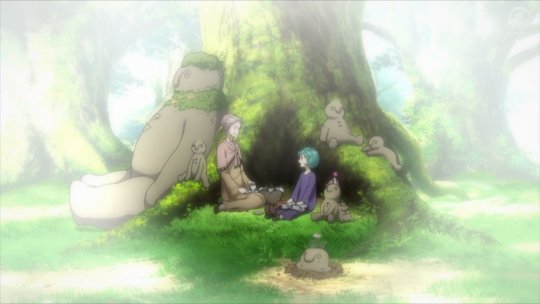
Over the years I, and many others, have been forced to come to terms with the fact that Berserk would likely never finish. The pattern of long, unexplained hiatuses and the solemn recognition that any of them could be the last is a familiar one. The double-edged sword of manga largely being works created by a single individual is that there is rarely anyone in a position to pick up the torch when the creator calls it quits. Takehiko Inoue’s Vagabond, Ai Yazawa’s Nana, and likely Yoshihiro Togashi’s Hunter X Hunter all frozen in indefinite hiatus, the publishers respectfully holding the door open should the creators ever decide to return, leaving it in a liminal space with no sense of conclusion for the fans except what we can make for ourselves.
The reason for Miura’s hiatuses was unclear. Fans liked to joke that he would take long breaks to play The Idolmaster, but Miura was also infamous for taking “breaks” spent minutely illustrating panels to his exacting artistic standard, creating a tumultuous release schedule during the wars featuring thousands of tiny soldiers all dressed in period-appropriate armor. If his health was becoming an issue, it’s uncommon that news would be shared with fans for most authors, much less one as private as Miura.
Even without delays, the story Miura was building just seemed to be getting too big. The scale continued to grow, his narrative ambition swelling even faster after 20 years of publication, the depth and breadth of his universe constantly expanding. The fan-dubbed “Millennium Falcon Arc” was massive, changing the landscape of Berserk from a low fantasy plagued by roaming demons to a high fantasy where godlike beings of sanity-defying size battled for control of the world. How could Guts even meet Griffith again? What might Casca want to do when her sanity returned? What are the origins of the Skull Knight? And would he do battle with the God Hand? There was too much left to happen and Miura’s art only grew more and more elaborate. It would take decades to resolve all this.
But it didn’t need to. I imagine we’ll never get a precise picture of the final years of Miura’s life leading up to his tragic passing. In the final chapters he released, it felt as if he had directed the story to some conclusion. The unfinished Fantasia arc finds Guts and his newfound band finding a way to finally restore Casca’s sanity and — although there is still unmistakably a boundary separating them — both seem resolute in finding a way to mend their shared wounds together.
One of the final chapters features Guts drinking around the campfire with the two other men of his group, Serpico and Roderick, as he entrusts the recovery of Casca to Schierke and Farnese. It's a scene that, in the original Band of the Hawk, would have found Guts brooding as his fellows engage in bluster. The tone of this conversation, however, is completely different. The three commiserate over how much has changed and the strength each has found in the companionship of the others. After everything that has happened, Guts declares that he is grateful.
The suicidal dedication to his quest for vengeance and dispassionate pragmatism that defined Guts in the earliest chapters is gone. Although they first appeared to be a source of strength as the Black Swordsman, he has learned that they rose from the fear of losing his friends again, from letting others close enough to harm him, and from having no other purpose without others. Whether or not Guts and Griffith were to ever meet again, Guts has rediscovered the strength to no longer carry his burdens alone.
All that has happened is all there will ever be. We too must be grateful.
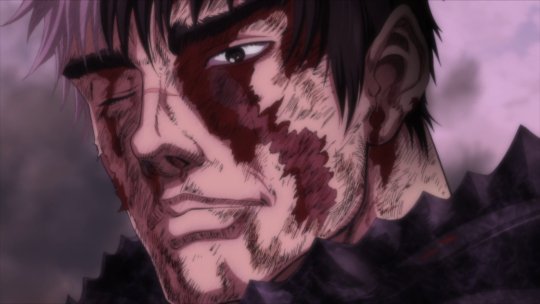
Peter Fobian is an Associate Manager of Social Video at Crunchyroll, writer for Anime Academy and Anime in America, and an editor at Anime Feminist. You can follow him on Twitter @PeterFobian.
By: Peter Fobian
4 notes
·
View notes
Text
How to Get Miniature Gaming Mileage Out of Old Role-Playing Games!
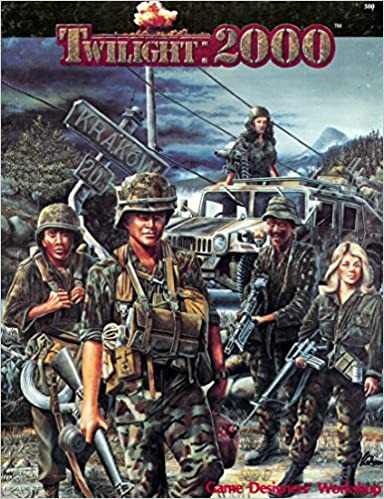
1st Edition box cover | Amazon.co.uk
I have been a wargamer since 1983 and a role player since 1985, and the truth is, no game was as formative to my gaming “zeitgeist” as it were, as was Twilight:2000. Why is this so? Because first, the timing of the game was excellent. The Cold War was in full swing, and Ronald Reagan was hell-bent on beating the Soviets, and it seemed to many, damned the cost. With movies like Threads, The Day After, and Testament being made, it seemed NATO and the Warsaw Pact might very well come to blows.
Or at least it did to this 10-year-old growing up in Gaithersburg, MD, which is a stone’s throw from Washington DC. Maybe it was my subconscious need to make sense of it all. Maybe I wanted to play something other than sword and sandal RPGs. I just wasn’t that into that sort of thing? Well, come one day, I was reading Analog magazine, and I read a review of Twilight:2000. I was hooked. I got the game as a birthday present that next summer and collected pretty much everything that came out for the game until GDW folded up shop in 1993, but here I was, plenty of books and a fertile ground of ideas…what to do with it, right?
I was fortunate in that the game has had something of a bias towards miniatures since the beginning. In fact, a set of Twilight:2000 miniatures rules were published in Challenge Issue 25, which was GDW’s house magazine for its RPGs. (The rules had a very proto-Command Decision feel and could be its predecessor.)

US Army Vehicle Guide Cover | Amazon.com
Furthermore, the game had an official line of miniatures (by Grenadier Miniatures, long OOP), but if you look hard at convention flea markets (bring and buys to our British cousins), you’ll still find from time to time a supply of the figures usually in lots of 6 or 8 packs of figures. The miniatures themselves are a bit smallish compared to some 20mm lines (Britannia comes to mind), but they’ll fit in well with some others, like Ehliem, and they have some nice poses and sculpts.
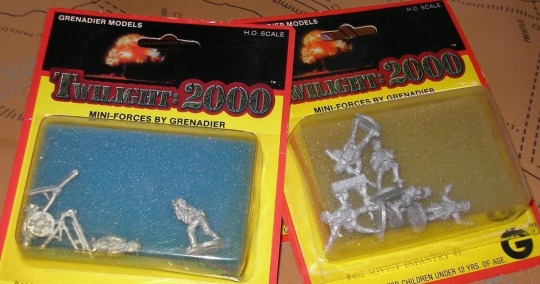
Jason Weiser, “500 Miles..”
And if that wasn’t enough? GDW published the US Army Vehicle Guide, which had an entire section, and black and white pictorial on just how to use Roco and Roskopf vehicles with your figures (not to mention how to make conversions of some of the harder to find stuff). Dated stuff today, but the pictures are a real bit of inspiration on how a gaming table for Twilight:2000 should look.
So, this all inspired the beginnings of my blog. I’d done some stuff for Twilight:2000 before, on the late, lamented Guild Wargamers forum. (which was a real boon for all things 20mm) and I wanted to write a blog to tell those small group of souls that “Good Luck, You’re Not Alone” in this crazy subset of a subset of a hobby, and with all this Cold War Gone Hot nostalgia going around (Down in front, Team Yankee!), I thought, “perfect time for a blog, right?”
So thus, “500 Miles to the German Border” was born. I was prolific my first year and wrote a wargaming-focused analysis on everything that could be of use to the Twilight: 2000 gamer. I think my best stuff has been my writeups of the various role-playing modules as suitable miniature wargaming scenario material, but I have found my blog being quoted in a lot of places, including The Miniatures Page, and even some Twilight:2000 role-playing pages as they mine it back for ideas.
This is just my own experience, really, but honestly? There’re tons of older RPGs out there, collecting dust and not being played, but they’re chock full of ideas that await the application of your favorite miniatures rules sets(s). But the best advice I can give is the following.
Pick a single game and stick with it: It really works best this way. Focusing on Twilight: 2000 has let me do a lot with the game and let me reexamine an old favorite in a new light. I mean, I didn’t realize that Allegheny Uprising could probably take the cake as “grimmest adventure I’ve ever read”. This is especially true when you’re searching the module for miniature gaming ideas, and they’re all grim. And readers like knowing what to expect from each blog entry.
2. Be flexible: It’s more important you stick with the spirit of the game than the letter. I will admit I have had to fudge here and there (the canon color plates in the Vehicle Guides versus the RL schemes that probably would have been used in my vehicle color schemes articles is a good example).
Respect the Copyright: You’re playing in someone else’s sandbox, so be a good net citizen and don’t be posting PDFs online or such. If you must quote, use citations. And always credit photos if you can. I know that’s not always possible but get in the habit of doing so.
Listen to feedback: Sometimes, comments can really be a big help. My figure review articles, for example, have been nothing but improved due to the assistance some posters have provided (especially the 28mm article, which is a scale I know little to nothing about).
Know your audience: My audience, for example, is going to want all sorts of tutorials, news on where to get neat stuff to improve on that Twilight: 2000 look on the table, and plain inspiration anywhere you can get it. When I am not writing on a topic myself, I am recruiting contributors, and I have two part-time contributors already!
So, what does all this mean for the miniatures gamer who is looking to crack open a “dead” RPG for inspiration? Well, there’s a fertile ground out there. You’d be surprised what you can find, and honestly, a few throwaway sentences buried in an adventure can be the basis of a great scenario or two for the tabletop.
And that’s the final point, do something that makes you want to write about it. Blog writing for miniature wargaming should never be a chore. And be consistent, if not prolific, once or twice a month for a posting schedule is pretty good and will keep your fans satisfied for the most part. And do not be afraid to ask your audience occasionally what they’d like to see. You’d be surprised as to what they might come up with.
So, how is this Not Another Third World War?
As you’ve read from the sidebar, Twilight: 2000 wasn’t a game that posited the usual what I call “Soviet Sunday Drive to the Rhine.” Instead, the Warsaw Pact was on the defensive for most of the game’s background (which can make for some interesting games for all those 6mm types, as all the vehicle guides have HELPFUL information on TOEs). Also, with the end of the Cold War, there are tons of declassified materials you can mine for orders of battle, scenario ideas, and a whole host of other things. (And EpochXperience can help you with that, we’ve got a lot of archival experience!)
By the time 2000 rolls around, you have a background that has some of the bells and whistles left, but not all. What’s striking and fun is the dichotomy. Horse Cav with GPMG and ATGM, MBTs running on hooch and different uniforms even within the same unit. And you can steal ideas from Mad Max, Day After, or dare I say it? Threads? (There is a certain traffic warden that would look awesome in 20mm, and Ehliem makes a nice figure that would make a great starting point. Crooked Dice also makes him in 28mm!). All of this is a historical zeitgeist of the 1980s, where we were pretty convinced the Cold War was going to end with a bang and not a whimper. It left a big impression on my life.
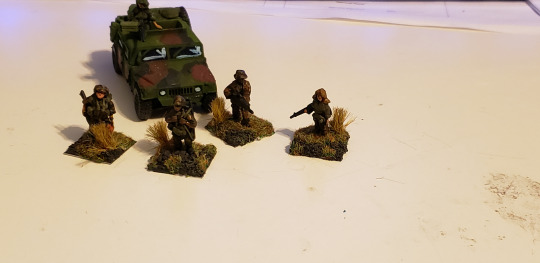
Figures by Ehliem | Jason Weiser, “500 Miles…”
What’s also nice? If you like infantry heavy games? This milieu is for you. As I said before, there’s some ironmongery, but not a lot. And for the modelers? The fact there is fewer vehicles and heavy weapons means you can let your imaginations run riot and really personalize your AFVs and other vehicles, as the “gypsy caravan” look is very, very in Twilight: 2000.
So, there is a rich tapestry out there for a 35-year-old RPG and plenty of 15 and 20mm figures out there to paint up for it. Why not give it a try?
About Twilight: 2000
Twilight:2000 burst onto the scene in November 1984 in a period of high tension during the Cold War. It took a then likely East-West confrontation and turned it into good RPG fodder, with some historical allegory to the Thirty Years War (with Poland standing in for Germany).
The game’s initial background posited a Soviet invasion of China after escalating border tensions in the then-future of 1995. This distracted the Soviet Union, and West Germany, in cooperation with East Germany, moved to kick the Soviets out of East Germany by force of arms. This naturally went badly, and expanded into a Third World War that pulled NATO and the Warsaw Pact. The second edition of the game was printed in 1990 and changed the flashpoint to German/Polish border issues in Western Poland and ethnic Germans in Silesia, and the 2.2 edition of the game was published in 1993, just before GDW folded and changed the timeline again, this time positing a successful hardliner coup in 1991.
The game, while a bit dated, still has something of a following and was even an attempt to bring the game back as Twilight: 2013 in 2008, to mixed reviews, and the game still has a small but fanatically loyal fanbase as the story of soldiers lost, far from home in a post-apocalyptic landscape has had something of an appeal since the story of Xenophon.
--
At Epoch Xperience, we specialize in creating compelling narratives and provide research to give your game the kind of details that engage your players and create a resonant world they want to spend time in. If you are interested in learning more about our gaming research services, you can browse Epoch Xperience’s service on our parent site, SJR Research.
--
(This article is credited to Jason Weiser. Jason is a long-time wargamer with published works in the Journal of the Society of Twentieth Century Wargamers; Miniature Wargames Magazine; and Wargames, Strategy, and Soldier.)
0 notes
Link
IN A CLOSED-DOOR meeting with activists from the American Israel Public Affairs Committee on Tuesday, presidential candidate Sen. Cory Booker, D-N.J., spoke about working closely with the organization and his desire to create a “unified voice from Congress” against the boycott, divestment, and sanctions movement, or BDS. Booker spoke to AIPAC members from New Jersey at the organization’s annual policy conference in Washington, D.C., a gathering of thousands of activists from around the country, culminating in a lobbying effort on Capitol Hill. Booker’s appearance came at a contentious time; last week, the progressive advocacy group MoveOn called on 2020 candidates to skip the conference, and at least five of the Democrats declined to attend. Booker’s remarks, some of which were first reported by the Jerusalem Post, did not appear on a schedule of on-the-record events for journalists covering the conference. The Intercept obtained a 35-minute audio recording of the session from a conference attendee and is publishing the recording in full here. AIPAC did not respond to multiple requests for comment. A spokesperson for Booker reviewed a transcript of the audio and confirmed that it matched what was said, but declined to comment further. Booker began his remarks by thanking AIPAC president Mort Fridman for his “leadership and his friendship,” telling the crowd that he and Fridman “talk often” and “text message back and forth like teenagers.” Much of Booker’s address focused on opposing the nationwide rise in bigotry and anti-Semitism, and he cited the FBI’s finding that between 2016 and 2017, hate crimes in New Jersey alone rose by 76 percent. Later, Booker told a story about rushing to Dulles Airport after President Donald Trump’s Muslim ban was announced, and said he was inspired by Jewish activists to vocally participate in protests. “This is the Jewish way,” said Booker, paraphrasing the Torah. “Love strangers, for you were once a stranger in a strange land.” In describing his opposition to anti-Semitism, Booker continually brought up congressional legislation aimed at punishing BDS, a global movement focused on pressuring Israel to end human rights violations and its military occupation of the Palestinian territories. The disruption of BDS activism is an Israeli foreign policy priority, and AIPAC has successfully lobbied Congress, as well as numerous state and local legislatures, to sanction the BDS movement. “Let me be clear,” Booker said. “Anti-Semitism is un-American. It is anti- American. It violates, most deeply, our commonly held values, and we must take steps on the global stage against vicious acts that target hatred. That is why I’m a co-sponsor of Senate Bill 720, the Israel Anti-Boycott Act, which opposes international efforts to encourage BDS while protecting First Amendment rights.” The Israel Anti-Boycott Act, introduced by Sens. Ben Cardin, D-Md., and Rob Portman, R-Ohio, would tweak U.S. export law to discourage American companies from joining international organizations in boycotting Israel. The bill steadily gained support until the American Civil Liberties Union announced its opposition, arguing that the text could be interpreted to allow criminal penalties for nonviolent activism. The bill was later changed to reflect those concerns, but it remains controversial, and Booker is the only 2020 Democratic candidate from the Senate who is a co-sponsor. BIPARTISAN UNITY WAS a major focus of Booker’s address, in which he denounced Vice President Mike Pence’s remarks to AIPAC earlier in the week as “rank partisanship” and “a cynical attempt to drive a wedge through the pro-Israel community.” Pence had called Trump “the greatest friend of the Jewish people and the state of Israel ever to sit in the Oval Office” and criticized Democratic candidates who skipped the conference. “I listened to the vice president yesterday,” said Booker. “There was no grace in his remarks. There was no ‘let’s reach out and unify Democrats and Republicans.’” In the past, AIPAC has always positioned itself as a staunchly bipartisan organization, winning near-universal support for its legislative priorities. Past policy conferences have made a show of Democrats speaking alongside Republicans. Last year, Reps. Steny Hoyer, D-Md., and Kevin McCarthy, R-Calif., both leadership members in their respective parties, walked onstage together and spoke about their commitment to the U.S.-Israel alliance. But in recent years, Republicans and Israeli Prime Minister Benjamin Netanyahu have split with that tradition, and the Trump administration has tried to make the case to AIPAC’s constituency that it is more willing to deliver on Israel’s geopolitical priorities. The administration stopped abiding by the terms of the Obama-era Iran deal, which AIPAC opposed. They have moved the U.S. Embassy from Tel Aviv to Jerusalem; recognized the occupied Golan Heights as Israeli territory; shunned Palestine at the United Nations; and cut the U.S. contribution to the U.N. agency supporting Palestinian refugees. Trump, more bluntly, has tweeted in support of a “Jexodus,” a so-called Jewish Exodus from the Democratic Party, but survey data does not suggest that Jewish voters — most of whom vote liberal and Democratic — are flocking to support him. But even as the progressive wing of the Democratic party has increasingly shown a willingness to criticize Israel, Booker has tried to smooth over the widening rift. “Don’t fall prey to cynical attempts to try to pit members of this great organization against the Democratic Party,” he told the audience Tuesday. “We, right now, need voices in our country that are going to show the tribalism that is deepening in our country, that undermines obvious things to do like condemning the BDS movement.” Booker also singled out Senate Majority Leader Mitch McConnell, R-Ky., for criticism, accusing him of playing politics with anti-BDS legislation. In February, Senate Republicans passed a legislation package that included a Republican anti-BDS measure, authored by Sen. Marco Rubio, R-Fla. Booker argued that the package was not designed to get bipartisan buy-in, and McConnell should have advanced other anti-BDS legislation instead. Booker told the audience that he had sponsored an amendment that would prevent states and localities from making their employees promise not to boycott Israel, a measure that he said would make the bill acceptable to both parties. “Mitch McConnell, in a cynical way, put a bill on the floor,” Booker said. “So I turned to AIPAC, to my friends, the leadership, and said, ‘Well, here’s a perfect amendment that can cure this bill, get a united Senate voice against BDS.’ But my amendment wasn’t even given a vote.” Join Our Newsletter Original reporting. Fearless journalism. Delivered to you. I’m in Without naming Rep. Ilhan Omar, D-Minn., Booker also condemned her recent remarks as “absolutely unacceptable.” Tweeting about AIPAC’s influence in Congress last month, Omar wrote: “It’s all about the Benjamins, baby” – referencing pro-Israel political action committees and their ability to raise money for candidates. Critics argued that the tweet invoked anti-Semitic tropes, and Omar later apologized, and said her intention was not to offend Jewish constituents. As part of his presidential campaign, Booker said, he had the “courage to speak to my own party” to try to find unity on a number of issues, including Israel. Booker also told the audience that when Netanyahu addressed Congress during the Obama administration in opposition to the Iran deal, Booker worked with AIPAC to try to stop fellow Democrats from boycotting the speech, “because we need to show a unified front in our support for Israel.” Before Booker took questions, Fridman told the audience that Booker was quick to assure conference organizers he would attend, despite pressure from progressive groups. “Cory was the subject of some fake news,” Fridman said. “An organization threatened a number of presidential candidates and said ‘don’t show up to AIPAC.’ I immediately got a call from Cory’s office saying well obviously Cory’s gonna be there… . Cory stands with the state of Israel. And Cory stands with the US –Israel alliance.” Correction: March 30, 2019, 3:52 p.m. EDT An earlier version of this story incorrectly said that Booker served in the House of Representatives during the Obama administration. Booker has been in the Senate since he won a special election in October 2013.
0 notes